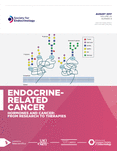WOMEN IN CANCER THEMATIC REVIEW: Thyroid-stimulating hormone in thyroid cancer: does it matter?
- 1Institute of Metabolism and Systems Research, University of Birmingham, Edgbaston, Birmingham, UK
- 2Centre for Endocrinology, Diabetes and Metabolism, Birmingham Health Partners, Birmingham, UK
- Correspondence should be addressed to K Boelaert; Email: k.boelaert{at}bham.ac.uk
Abstract
Differentiated thyroid cancer is the most common endocrine malignancy and the incidence is increasing rapidly worldwide. Appropriate diagnosis and post-treatment monitoring of patients with thyroid tumours are critical. Fine needle aspiration cytology remains the gold standard for diagnosing thyroid cancer, and although there have been significant refinements to this technique, diagnostic surgery is often required for patients suspected to have malignancy. Serum thyroid-stimulating hormone (TSH) is higher in patients with malignant thyroid nodules than in those with benign disease, and TSH is proportionally increased in more aggressive tumours. Importantly, we have shown that the pre-operative serum TSH concentration independently predicts the presence of malignancy in subjects presenting with thyroid nodules. Establishing the use of TSH measurements in algorithms identifying high-risk thyroid nodules in routine clinical practice represents an exciting, cost-efficient and non-invasive approach to optimise thyroid cancer diagnosis. Binding of TSH to receptors on thyrocytes stimulates a number of growth promoting pathways both in normal and malignant thyroid cells, and TSH suppression with high doses of levothyroxine is routinely used after thyroidectomy to prevent cancer recurrence, especially in high-risk tumours. This review examines the relationship between serum TSH and thyroid cancer and reflects on the clinical potential of TSH measurements in diagnosis and disease monitoring.
- Received 13 September 2016
- Accepted 15 September 2016
- Made available online as an Accepted Preprint 15 September 2016
- © 2016 Society for Endocrinology












